Related Research Articles

"Achy Breaky Heart" is a song written in 1990 by Don Von Tress. First released in 1991 by the Marcy Brothers with the title "Don't Tell My Heart", it was later recorded by American singer and actor Billy Ray Cyrus and released on his debut album, Some Gave All (1992). The song is Cyrus's debut single and signature song. It became the first single ever to achieve triple platinum status in Australia and also 1992's best-selling single in the same country. In the United States, it became a crossover hit on pop and country radio, peaking at No. 4 on the Billboard Hot 100 and topping the Hot Country Songs chart, becoming the first country single to be certified platinum since "Islands in the Stream" by Kenny Rogers and Dolly Parton in 1983. The single topped in several countries, and after being featured on Top of the Pops in the United Kingdom, peaked at No. 3 on the UK Singles Chart. It was Cyrus's biggest hit single in the U.S. until he was featured on "Old Town Road" by rapper Lil Nas X, which peaked at No. 1 on the Billboard Hot 100 27 years later.

"You Light Up My Life" is a ballad written by Joseph Brooks, and originally recorded by Kasey Cisyk for the soundtrack album to the 1977 film of the same title. The song was lip synced in the film by its lead actress, Didi Conn. The best-known cover version of the song is a cover by Debby Boone, the daughter of singer Pat Boone. It held the No. 1 position on the Billboard Hot 100 chart for ten consecutive weeks in 1977 and topped Record World magazine's Top 100 Singles Chart for a record 13 weeks.
"She's Gone Gone Gone" is a country music song written by Harlan Howard and originally recorded by American singer Lefty Frizzell. Frizzell's version of the song reached number 12 on the Billboard Hot Country Singles & Tracks chart.

"Count Your Blessings, Woman" is a song written by Bill Anderson that was originally recorded by American country artist Jan Howard. Released as a single in 1968, it placed in the top 20 on the US country chart and the top ten on the Canadian country chart. It was released on an album of the same name and was given reviews from both Billboard and Cash Box magazines.
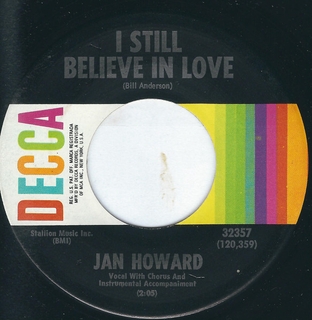
"I Still Believe in Love" is a song written by Bill Anderson that was originally recorded by American country artist Jan Howard. Released as a single by Decca Records, it made the top 40 on the US country chart and the top ten on the Canadian country chart. It was given reviews from both Billboard and Cash Box magazines.

"My Son" is a song written and recorded by American country music singer Jan Howard. It is among several songs recorded by country artists during this period that related to the Vietnam War. The song is based on a letter Howard wrote to her son, Jimmy, who was drafted into the war. After writing the letter, she was inspired by family and friends to put it to music. Recording the song in a single take, it was released as a single in 1968.
"Love Is Like a Spinning Wheel" is a single by American country music artist Jan Howard. Released in November 1971, the song reached #36 on the Billboard Hot Country Singles chart. The single was later released on Howard's 1972 album of the same name. The song became Howard's first solo top forty single in two years. The song became a major hit in Canada, peaking at #14 on the Canadian RPM Country Tracks chart, her last solo single to chart in Canada.
"Dis-Satisfied" is a single by American country music artists Bill Anderson and Jan Howard. Released in September 1971, it was the second single and from their album Bill and Jan . The song reached #4 on the Billboard Hot Country Singles chart. The single became the duo's final major hit and charting single. The song additionally peaked at #11 on the Canadian RPM Country Tracks chart.

Count Your Blessings, Woman is a studio album by American country music artist Jan Howard. It was released in June 1968 via Decca Records and contained 11 tracks. Many of the album's tracks were cover tunes with the exception of the title track. Released as a single, the title track was a top 20 US country song and a top ten Canadian country song. The album itself made the top 30 of the US country survey. Howard's vocal performance was praised in reviews by Billboard and Cash Box magazines.
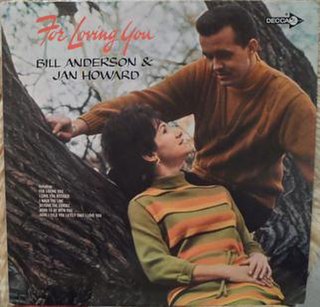
For Loving You is a studio album released by the American country music artists Bill Anderson and Jan Howard in February 1968 on Decca Records. The album was their first collaborative album, setting the trend for a series of studio albums over the next few years. The album's title track, "For Loving You", was the lead single and became a number 1 hit on the Billboard country songs chart.
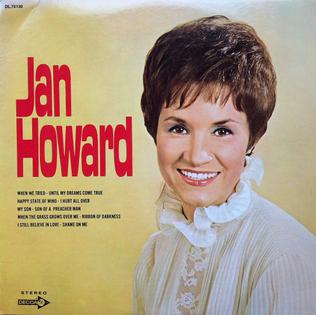
Jan Howard is an eponymous studio album by American country artist Jan Howard. It was released by Decca Records in June 1969 and contained ten tracks. The project contained a series of cover tunes, along with new songs. Among the new recordings were three singles: "I Still Believe in Love", "My Son" and "When We Tried". "My Son" was a letter Howard put to music written to her son who was killed in the Vietnam War. The album was given positive reception by Cash Box and Record World magazines. The album made the US country albums and its three singles reached positions on the North American country songs charts.
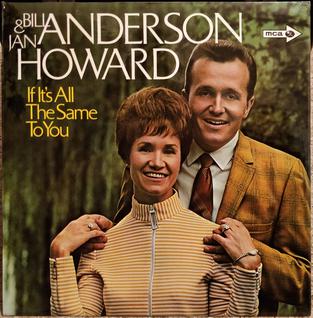
If It's All the Same to You is a studio album by American country music artists Bill Anderson and Jan Howard. The album was released on Decca Records in March 1970 and was produced by Owen Bradley. It was the pair's second collaborative album after several years of performing together on tour and on television. The album's title track became a major hit on the Billboard country chart, reaching the top 10. Additionally, the album itself would reach peak positions on the Billboard country albums chart.

Bill and Jan (Or Jan and Bill) is a studio album released by American country artists Bill Anderson and Jan Howard. It was released in January 1972 on Decca Records and was produced by Owen Bradley. It was the duo's third collaborative album together and featured singles that became hits on the Billboard country chart. The album itself would also chart on the Billboard country albums list in 1972.
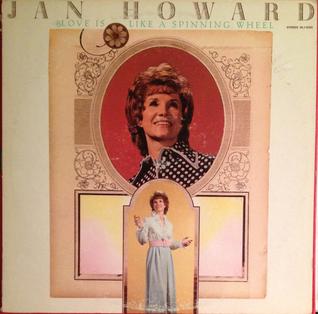
Love Is Like a Spinning Wheel is the twelfth studio album by American country artist Jan Howard. It was released in March 1972 on Decca Records and was produced by Owen Bradley. The album spawned two singles that became minor hits on the Billboard country songs chart. It was one of Howard's final studio albums for the Decca label before departing the label within a year's time.

My Life/But You Know I Love You is a studio album by American country singer-songwriter Bill Anderson. It was released in June 1969 on Decca Records and was produced by Owen Bradley. It was Anderson's eleventh studio album to be issued during his musical career. The album's title combines the names of its two singles. Both singles became major hits on the Billboard country chart.
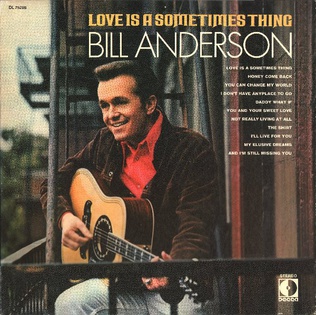
Love Is a Sometimes Thing is a studio album by American country singer-songwriter Bill Anderson. It was released in June 1970 on Decca Records and was produced by Owen Bradley. It was Anderson's fourteenth studio album since signing with the Decca label in 1958. Its only single, the title track, would become a major hit on the Billboard country chart in 1970. The album itself would also reach peak positions on the country albums chart following its release.
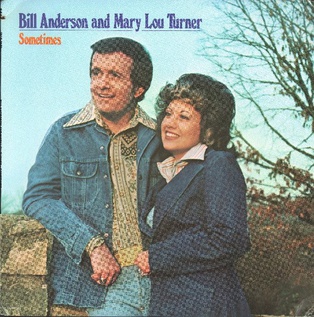
Sometimes is a studio album by American country music artists Bill Anderson and Mary Lou Turner. It was released in January 1976 on MCA Records and was produced by Owen Bradley. It was Anderson's twenty fourth studio recording and Turner's first. The album's title track became a major hit on the country charts in both the United States and Canada. The album also reached major positions on the country chart in the United States. Sometimes was the first collaborative project between Anderson and Turner. Anderson hired Turner to work as his duet partner during this period and the project was one of two recordings they made.

Billy Boy & Mary Lou is a studio album by American country music artists Bill Anderson and Mary Lou Turner. It was released in June 1977 on MCA Records and was produced by Buddy Killen. It was the duo's second studio album together since pairing up as a duet team in the mid 1970s. The album produced two singles between 1977 and 1978. It would be the duo's final studio album together.
"Love Is a Sometimes Thing" is a song written by Jan Howard. It was first recorded by American country singer-songwriter Bill Anderson. It was released as a single in 1970 via Decca Records and became a major hit the same year.
"Love Knows We Tried" is a song written by Rory Bourke, Kerry Chater and Jan Crutchfield, and recorded by American country music artist, Tanya Tucker. It released in April 1981 as the third single from the album Dreamlovers. The song reached the top forty of the North American country music charts.
References
- ↑ Whitburn, Joel (2004). The Billboard Book Of Top 40 Country Hits: 1944-2006, Second edition. Record Research.
- ↑ "Search results for "Jan Howard" under Country Singles". RPM . Archived from the original on 19 February 2013. Retrieved 17 January 2013.